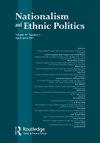雪松革命后黎巴嫩的联合主义:外部威胁、政治不稳定和宏观证券化
IF 1.1
Q3 ETHNIC STUDIES
引用次数: 2
摘要
关于联合主义的文献认为,如果所有政治阶层都认为外部威胁是共同的,那么外部威胁会增加联合体制中的精英合作和政治稳定。黎巴嫩——一个突出的联合案例——让我们进一步思考这一命题,因为国际危机甚至战争并没有增加政党之间的合作。为了进一步探讨外部威胁与政治稳定之间的关系,本文提出了一种基于哥本哈根安全学派的关键安全方法。该研究调查了政治精英如何依靠媒体分析、个人精英和专家访谈以及二手资源来构建外国威胁。研究发现,尽管政治精英致力于系统维护,但外部威胁降低了黎巴嫩的政治稳定,因为政治部门是相互竞争的宏观证券化的一部分。本文章由计算机程序翻译,如有差异,请以英文原文为准。
Consociationalism in Lebanon after the Cedar Revolution: External Threats, Political Instability, and Macrosecuritizations
Abstract The literature on consociationalism posits external threats increase elite cooperation and political stability in consociational systems, provided that the threat is perceived as common by all political segments. Lebanon—a prominent consociational case—invites further reflection on this proposition, as international crises and even war did not increase cooperation between political parties. To further explore the relationship between external threats and political stability, the paper proposes a critical security approach, based on the Copenhagen School of security. The study investigates how political elites construct foreign threats relying on media analysis complemented by personal elite and expert interviews, as well as secondary sources. The study finds that despite political elites’ commitment to system maintenance, external threats decrease political stability in Lebanon because political segments are part of competing macrosecuritizations.
求助全文
通过发布文献求助,成功后即可免费获取论文全文。
去求助
来源期刊

Nationalism and Ethnic Politics
ETHNIC STUDIES-
CiteScore
1.30
自引率
0.00%
发文量
30
期刊介绍:
Nationalism & Ethnic Politics explores the varied political aspects of nationalism and ethnicity in order to develop more constructive inter-group relations. The journal publishes case studies and comparative and theoretical analyses. It deals with pluralism, ethno-nationalism, irredentism, separatism, and related phenomena, and examines processes and theories of ethnic identity formation, mobilization, conflict and accommodation in the context of political development and "nation-building". The journal compares and contrasts state and community claims, and deal with such factors as citizenship, race, religion, economic development, immigration, language, and the international environment.
 求助内容:
求助内容: 应助结果提醒方式:
应助结果提醒方式:


